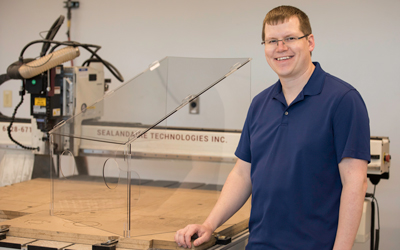Stay-at-home orders, social distancing and medical masks have limited the exposure of most Americans to the coronavirus. But how do we protect the most exposed of all: health care workers?
Enter Cedarville University alumnus Stephen Smith and his aerosol box, a three-sided rectangular cube that’s placed over the head and upper torso of COVID-19 patients. Two arm holes at the front allow medical personnel to place a tube into a patient’s airway to help them breathe without being splattered by the resulting cannon-blast, germ-soaked cough caused by the irritation of the procedure.
Smith, a 2009 mechanical engineering graduate, found out about the aerosol box after searching a website that featured open-source designs for masks, face shields and other personal protective equipment. He currently works as a mechanical engineer for SeaLandAire Technologies, Inc., in Jackson, Michigan, where he develops sonobuoys, used to detect submarines, and unmanned autonomous vehicles.
“I was looking into ways to contribute during the coronavirus pandemic,” Smith explained. “One of my former co-workers from when I taught English in China pointed me to this site.”
He began discussing the aerosol box concept with other engineers, medical personnel — even furniture makers — from around the world who were also trying to figure out a way to help fight the pandemic. From this online collaboration, he came up with his own version of the COVID-19 containment unit.
“Two days into the project I decided to make my first prototype,” Smith said. “I started working with a physician assistant who goes to my church and works at a local hospital in Jackson, Michigan, to learn from her medical expertise. She talked to her hospital Friday night and by Saturday morning, they asked if they could have one. I was able to use SeaLandAire Technologies’ lab to build a prototype within one day and delivered it to the hospital Sunday afternoon, March 29.”
While some aerosol boxes he’s seen require gluing of pieces and hours of drying before they’re ready to use, Smith’s design can be assembled and ready in five minutes with snug, snap-together sections. Afterward, the box can be disassembled, cleaned and stored.
Since that first delivery, Smith has built and delivered 14 more to hospitals, emergency medical services, and medical facilities in Ohio, Michigan, Maryland and Massachusetts. He has also collaborated with teams in Brazil, India and Malaysia to take his design internationally.
While designing and creating his box, Smith contacted his former mechanical engineering professors at Cedarville University, Jay Kinsinger and Dr. Tim Dewhurst, to see if they could develop an aerosol box for distribution in Ohio, where he has received a number of orders.
“In World War II, people had victory gardens,” noted Kinsinger. “This is our version of the victory garden, our ability to do something to fight this crisis we’re in now.”
With the machine tools available at Cedarville and a partnership with Custom Router Works in Jackson, Michigan, Smith and Kinsinger estimate they can produce more than 100 aerosol boxes a day.

“I started this project to help save lives during the pandemic,” Smith said. “I felt that contributing my engineering skills to save lives was a great way to put my faith into action. Now, we’re trying to get this out there in the hands of doctors on the frontlines as soon as possible.”
Smith sells his aerosol box for slightly above cost. He has also donated several of the devices. For more information, visit michiganaerosolbox.com.
Located in southwest Ohio, Cedarville University is an accredited, Christ-centered, Baptist institution with an enrollment of 4,380 undergraduate, graduate and online students in more than 150 areas of study. Founded in 1887, Cedarville is recognized nationally for its authentic Christian community, rigorous academic programs, including its Bachelor of Science in Mechanical Engineering program, strong graduation and retention rates, accredited professional and health science offerings and high student engagement ranking. For more information about the University, visit cedarville.edu.
